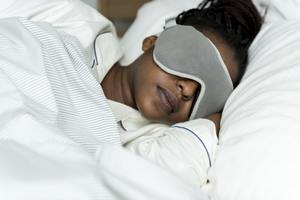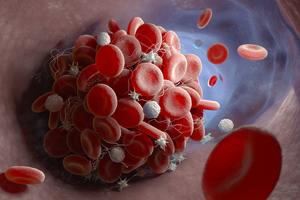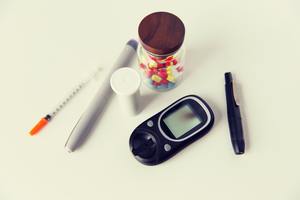You may not realize how closely blood circulation and sleep are linked. A good night’s rest is important for many aspects of our health, and good blood circulation is one of them. It’s a never-ending cycle, because poor circulation can also increase feelings of tiredness and fatigue. On the flip side, good sleep can lower your risk of poor circulation, high blood pressure, and cardiovascular diseases.
What happens to blood pressure when we sleep?

Blood pressure fluctuates as you move through your regular sleep cycles. There are two major sleep cycles: rapid eye movement (REM) and non-rapid eye movement (non-REM). During non-REM, your heart rate and blood pressure go down. These rise again during REM, and fluctuate similar to daytime patterns. As you wake up, heart rate and blood pressure pick back up. This is why chances of heart attack are higher in the morning.
Poor Sleep and Its Effects
Beyond what happens during a regular night’s sleep, blood pressure can be affected by poor sleep or sleep disturbances. This can be a short-term affect from one night of poor sleep, or consistent high blood pressure from chronic conditions like insomnia.
The CDC (Center for Disease Control and Prevention) determined that around 35% of the population in the U.S. are getting fewer than 7 hours of sleep each night (2014).
They also found that inadequate sleep increased risk for other conditions, as listed here:
| Chronic Condition | In adequate sleep (< 7 hours) | Adequate Sleep (< 7 hours) |
| Heart Attack | 4.8% | 3.4% |
| Coronary heart disease | 4.7% | 3.4% |
| Stoke | 3.6% | 2.4% |
| Asthma | 16.5% | 11.8% |
| COPD (chronic obstructive pulmonary disease) | 8.6% | 4.7% |
| Cancer | 10.2% | 9.8% |
| Arthritis | 28.7% | 2.5% |
| Depression | 22.9% | 14.6% |
| Chronic Kidney Illness | 3.3% | 2.2% |
| Diabetes | 11.1% | 8.6% |
Poor circulation is one of the results of poor sleep. But how does that actually work? Poor sleep can contribute to several factors that lead to poor circulation, including buildup in the arteries and high blood pressure. Let’s take a look at what we know about sleep and blood flow.
Atherosclerosis

Studies have shown that poor sleep can contribute to atherosclerosis. Atherosclerosis means that there is buildup in the arteries—made up of cholesterol, fats, and others substances. This causes the arteries to harden and it restricts blood flow.
One study shows that less than 6 hours of sleep per night can increase risk of atherosclerosis by up to 27%.
However, another study adds that sleeping more than 8 hours was also linked with atherosclerosis, especially among women. The Journal of the American College of Cardiology also agrees that both too much and too little sleep are both linked with plaque buildup.
Atherosclerosis can lead to raised blood pressure, poor circulation, and increase your risk for conditions such as heart disease, heart attack, and stroke. Getting 7 – 8 hours of sleep seems to bet the optimum amount for avoiding atherosclerosis.
High Blood Pressure
Lack of sleep can also lead to high blood pressure. As mentioned above, this can be in part because of atherosclerosis. But studies have shown that even one night of poor sleep can cause blood pressure to spike.
One article reports a correlation between insomnia and cardiovascular disease, noting that experimental sleep deprivation resulted in elevations in blood pressure.
Even minor sleep disturbances can raise blood pressure. One study examined the effects of poor sleep in women. (Women tend to get less sleep being primary caretakers of young children and the elderly, as well as experiencing frequent shifts in hormones). 323 healthy female patients ages 20 – 79 were tested for sleep quality and its effects. The results teach that it isn’t just the lack of sleep but any sleep disturbance can increase blood pressure.
Blood pressure is raised possibly because of inflammation. In the same study, scientists also found links between poor sleep and inflammation of the endothelial cells—the cells that line the inside of our blood vessels.
Another study showed that sleep can cause short-term spikes in blood pressure. One study observed the effects of poor sleep on patients with mild to moderate hypertension (high blood pressure). Even after one night of disrupted sleep, blood pressure and heart rate significantly increased.
Increased Risk of Diabetes

Remember the chart at the beginning? The CDC reported that 11.1% of those who slept less than 7 hours per night also had diabetes, compared to the 8.6% of people who got sufficient sleep.
Some research has shown that insomnia is also linked with impaired glucose metabolism. This means that the body can’t break down and process sugars as easily. This is also a factor of atherosclerosis.
The study in The Journal of the American College of Cardiology that examined sleep and atherosclerosis also noted that those who regularly slept fewer than 6 hours were more likely to have high blood pressure and diabetes.
High blood sugar levels can damage blood vessels over time, leading to further complications.
If you are at risk for diabetes, make sure you are getting enough sleep. If this is hard for you, talk with your doctor about what you can do to get better sleep.
Low miRNA Levels
Poor sleep has also been linked with low levels of molecules that help regulate protein expression, called micro RNA (or miRNA).
One study published in Experimental Physiology showed that people who sleep less than 7 hours tend to have lower levels of some miRNAs. These specific miRNAs (miR-123, miR-125, and miR-146a) suppress proteins that cause inflammation. Low levels of these miRNAs will naturally lead to greater inflammation and poor circulation. This increases a person’s risk of cardiovascular diseases and events like a stroke or heart attack.
Poor Cholesterol Metabolism
Researchers analyzed sleep and its effect on cholesterol metabolism (your body’s ability to process cholesterol). They found that the genes that help regulate cholesterol are less active in people who sleep less.
These people also had fewer high-density lipoproteins (HDL or “good” cholesterol). HDL cholesterol contains healthy fats and lowers levels of low-density lipoproteins (LDL or “bad” cholesterol).
This contributes to buildup of plaque in the blood vessels, atherosclerosis, and high blood pressure. It can also contribute to a higher risk of getting sick.
Maintain healthy cholesterol by getting a good night’s sleep. It is also important to focus on eating healthy cholesterol (such as fatty fish, vegetable oil, legumes, nuts and seeds) and avoiding bad cholesterol (like foods that are processed, hydrogenated, deep-fried, or contain unhealthy fats).
Poor Circulation and Its Effects
Plaque buildup, high blood pressure, and poor cholesterol metabolism—these are all things that can cause poor circulation. Other factors include diabetes, thyroid disease, and obesity.
Poor sleep clearly contributes to poor circulation. Research shows it also goes the other way—poor circulation can also lead to low energy levels, fatigue, and sleepiness. The heart also has to pump harder, which only creates more fatigue.

Poor circulation can also cause
- Numbness and tingling
- Cold hands and feet
- Joint pain and muscle cramping
- Digestive issues
- Ulcers in legs or feet
- Skin color changes
- Varicose veins
How to Improve Poor Circulation
- Get regular physical exercise
- Eat a heart healthy diet – low in fat, high in fiber, omega-3s, vitamin B6, B12, magnesium
- Maintain a healthy weight
- Bundle up (keep your limbs warm)
- Use compression socks
- Take aspirin or prescription drug as recommended by your doctor
- Consider a supplement such as l-arginine, which relaxes and opens your blood vessels
- Get plenty of sleep
Talk with your doctor about your poor circulation. Together you can determine the seriousness of your condition and which steps are best for you.
How to Improve Sleep
It’s important to build good habits in order to get the sleep you need. Consider these habits to help you sleep:
- Go to bed and waking up at the same time every day
- Stay consistent with your sleep schedule on weekends and holidays
- Turn off screens an hour before bed and do not have electronic devices in the bedroom
- Do something relaxing before bed like meditation, yoga, or reading
- Avoid eating heavy meals before bed
- Limit caffeine intake in the afternoon and evening
If you still struggle to sleep after implementing good habits, talk with your doctor. He or she may be able to prescribe a medication to help you sleep.
The Bottom Line
Blood circulation and sleep are intricately woven. Consistently getting a good night’s rest is crucial to your cardiovascular health. And it goes the other way, too. Maintaining healthy circulation will help you stay alert and energized.

